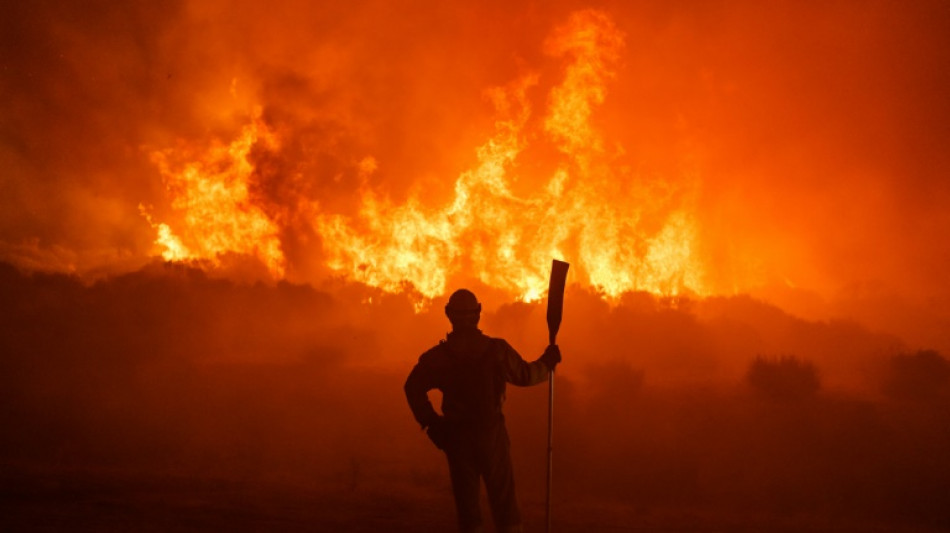
-
 Vonn to provide injury update as Milan-Cortina Olympics near
Vonn to provide injury update as Milan-Cortina Olympics near
-
France summons Musk for 'voluntary interview', raids X offices

-
 US judge to hear request for 'immediate takedown' of Epstein files
US judge to hear request for 'immediate takedown' of Epstein files
-
Russia resumes large-scale strikes on Ukraine in glacial temperatures

-
 Fit-again France captain Dupont partners Jalibert against Ireland
Fit-again France captain Dupont partners Jalibert against Ireland
-
French summons Musk for 'voluntary interview' as authorities raid X offices

-
 IOC chief Coventry calls for focus on sport, not politics
IOC chief Coventry calls for focus on sport, not politics
-
McNeil's partner hits out at 'brutal' football industry after Palace move collapses

-
 Proud moment as Prendergast brothers picked to start for Ireland
Proud moment as Prendergast brothers picked to start for Ireland
-
Germany has highest share of older workers in EU

-
 Teen swims four hours to save family lost at sea off Australia
Teen swims four hours to save family lost at sea off Australia
-
Ethiopia denies Trump claim mega-dam was financed by US

-
 Russia resumes strikes on freezing Ukrainian capital ahead of talks
Russia resumes strikes on freezing Ukrainian capital ahead of talks
-
Malaysian court acquits French man on drug charges

-
 Switch 2 sales boost Nintendo results but chip shortage looms
Switch 2 sales boost Nintendo results but chip shortage looms
-
From rations to G20's doorstep: Poland savours economic 'miracle'

-
 Russia resumes strikes on freezing Ukrainian capital
Russia resumes strikes on freezing Ukrainian capital
-
'Way too far': Latino Trump voters shocked by Minneapolis crackdown

-
 England and Brook seek redemption at T20 World Cup
England and Brook seek redemption at T20 World Cup
-
Coach Gambhir under pressure as India aim for back-to-back T20 triumphs

-
 'Helmets off': NFL stars open up as Super Bowl circus begins
'Helmets off': NFL stars open up as Super Bowl circus begins
-
Japan coach Jones says 'fair' World Cup schedule helps small teams

-
 Do not write Ireland off as a rugby force, says ex-prop Ross
Do not write Ireland off as a rugby force, says ex-prop Ross
-
Winter Olympics 2026: AFP guide to Alpine Skiing races

-
 Winter Olympics to showcase Italian venues and global tensions
Winter Olympics to showcase Italian venues and global tensions
-
Buoyant England eager to end Franco-Irish grip on Six Nations

-
 China to ban hidden car door handles in industry shift
China to ban hidden car door handles in industry shift
-
Sengun leads Rockets past Pacers, Ball leads Hornets fightback

-
 Waymo raises $16 bn to fuel global robotaxi expansion
Waymo raises $16 bn to fuel global robotaxi expansion
-
Netflix to livestream BTS comeback concert in K-pop mega event

-
 Rural India powers global AI models
Rural India powers global AI models
-
Equities, metals, oil rebound after Asia-wide rout

-
 Bencic, Svitolina make history as mothers inside tennis top 10
Bencic, Svitolina make history as mothers inside tennis top 10
-
Italy's spread-out Olympics face transport challenge

-
 Son of Norway crown princess stands trial for multiple rapes
Son of Norway crown princess stands trial for multiple rapes
-
Side hustle: Part-time refs take charge of Super Bowl

-
 Paying for a selfie: Rome starts charging for Trevi Fountain
Paying for a selfie: Rome starts charging for Trevi Fountain
-
Faced with Trump, Pope Leo opts for indirect diplomacy

-
 NFL chief expects Bad Bunny to unite Super Bowl audience
NFL chief expects Bad Bunny to unite Super Bowl audience
-
Australia's Hazlewood to miss start of T20 World Cup

-
 Bill, Hillary Clinton to testify in US House Epstein probe
Bill, Hillary Clinton to testify in US House Epstein probe
-
Cuba confirms 'communications' with US, but says no negotiations yet

-
 From 'watch his ass' to White House talks for Trump and Petro
From 'watch his ass' to White House talks for Trump and Petro
-
Trump says not 'ripping' down Kennedy Center -- much

-
 Sunderland rout 'childish' Burnley
Sunderland rout 'childish' Burnley
-
Musk merges xAI into SpaceX in bid to build space data centers

-
 Former France striker Benzema switches Saudi clubs
Former France striker Benzema switches Saudi clubs
-
Sunderland rout hapless Burnley

-
 Costa Rican president-elect looks to Bukele for help against crime
Costa Rican president-elect looks to Bukele for help against crime
-
Hosts Australia to open Rugby World Cup against Hong Kong


World must brace for more extreme wildfires: UN
The number of major wildfires worldwide will rise sharply in coming decades due to global warming, and governments are ill-prepared for the death and destruction such mega-blazes trail in their wake, the UN warned Wednesday.
Even the most ambitious efforts to curb greenhouse gas emissions will not prevent a dramatic surge in the frequency of extreme fire conditions, a report commissioned by the UN Environment Programme (UNEP) concluded.
"By the end of the century, the probability of wildfire events similar to Australia's 2019–2020 Black Summer or the huge Arctic fires in 2020 occurring in a given year is likely to increase by 31–57 percent," it said.
The heating of the planet is turning landscapes into tinderboxes, and more extreme weather means stronger, hotter and drier winds to fan the flames.
Such wildfires are burning where they have always occurred, and are flaring up in unexpected places such as drying peatlands and thawing permafrost.
"Fires are not good things," said co-author Peter, an expert in forest fire management at the UN's Food and Agriculture Organization (FAO).
"The impacts on people -- socially, health-wise, psychologically -- are phenomenal and long-term," he told journalists in a briefing.
Large wildfires, which can rage uncontrolled for days or weeks, cause respiratory and heart problems, especially for the elderly and very young.
A recent study in The Lancet concluded that exposure to wildfire smoke results, on average, in more than 30,000 deaths each year across 43 nations for which data was available.
Economic damages in the United States -- one of the few countries to calculate such costs -- have varied between $71 to $348 billion (63 to 307 billion euros) in recent years, according to an assessment cited in the report.
- Zombie fires -
Major blazes can also be devastating for wildlife, pushing some endangered species closer to the brink of extinction.
Nearly three billion mammals, reptiles, birds and frogs were killed or harmed, for example, by Australia's devastating 2019-20 bushfires, scientists have calculated.
Wildfires are made worse by climate change.
Heatwaves, drought conditions and reduced soil moisture amplified by global warming have contributed to unprecedented fires in the western United States, Australia and the Mediterranean basin just in the last three years.
Even the Arctic -- previously all but immune to fires -- has seen a dramatic increase in blazes, including so-called "zombie fires" that smoulder underground throughout winter before bursting into flames anew.
But wildfires also accelerate climate change, feeding a vicious cycle of more fires and rising temperatures.
Last year, forests going up in flames emitted more than 2.5 billion tonnes of planet-warming CO2 in July and August alone, equivalent to India's annual emissions from all sources, the European Union's Copernicus Atmosphere Monitoring Service (CAMS) reported.
Compiled by 50 top experts, the report called for a rethink on how to tackle the problem.
"Current government responses to wildfires are often putting money in the wrong places," investing in managing fires once they start rather than prevention and risk reduction, said UN Environment chief Inger Andersen.
"We have to minimise the risk of extreme wildfires by being prepared."
Nogueira--PC



